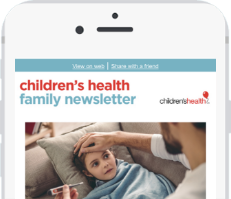Recognizing that your teen is struggling with substance use can be challenging. From mood swings to becoming distant, it's difficult for many parents to determine what’s normal teenage behavior and what may be a sign of a bigger problem.
Teenage drug and alcohol use statistics
If you wonder if your teen has a substance abuse problem, you are not alone. According to the 2023 Children's Health℠ Beyond ABC report:
- More than half of Texas students from seventh to 12th grades have used alcohol and 22% have used marijuana.
- In 2022, 11% of secondary students reported using a tobacco product in the last 30 days, while 22% reported using it at some other time.
- Nearly 182,000 Texas children are estimated to have a substance abuse problem but only 5% receive treatment through public resources and programs.
Additionally, a study conducted by the Center for Disease Control and Prevention (CDC) reported 60% of adolescents aged 13 to 18 used alcohol, marijuana or other drugs in the past 30 days.
Signs of substance abuse
Recognizing these warning signs can help you better understand if your child may be struggling with substance abuse.
- Mood, anxiety or conduct issues that have progressed quickly. A major sign for substance abuse in teens is atypical behavior including low energy and productivity, a lack of self-control or aggression.
- Inability to cope with minor frustrations. Be wary of consistent overreaction to minor situations.
- Unexplained school absences or tardiness. You should consider your child missing school without your approval a serious issue and address it immediately. Skipping classes is typical, as teens are likely to go off campus to use drugs.
- A notable decline in school performance. Failing tests and quizzes, bad grades in classes, and poor performance or behavior in the classroom are strong indicators of an underlying issue.
- Avoiding family or previous peer group and/or a change in peer group. Another red flag of substance abuse is poor interactions with family members, friends, classmates and teachers.
- Decline in hygiene or appearance. Drug use takes a noticeable toll on the body and causes a decreased interest in appearance.
- Your teen appears apathetic, sad or withdrawn. Each of these emotional states is a potential indicator of depression. Some teens who are undiagnosed will turn to drugs or alcohol, whereas others have depression caused by the effects of the drug use. Teens with depression are much more likely to have their occasional use of drugs or alcohol turn into an addiction.
- You have found drugs or paraphernalia or evidence of possible alcohol or drug use. This is the most definitive sign that your child is abusing drugs. The possession of items such as scales, pipes, bongs, lighters, balloons, table top vaporizers and rolling papers are all indicative of drug use. Snapchat or other social media messages discussing drug use are also good indicators. Another cause for concern is if you are missing any prescription pills or opioids without explanation. Be wary of a teen's reported explanation that they were "holding it for a friend," or that this is the first time they have ever obtained the drug. For every one incident that is seen, many more go undetected, and parents typically underestimate their child's involvement with drugs and alcohol.
- Signs of intoxication. Take notice if your teen returns home with evidence that they are intoxicated. Watch for pupils that are dilated or constricted, the area around the eyes reddened, difficulty walking, unexplained laughing and giddiness or trouble speaking clearly.
How to prevent teen drug and alcohol abuse
While it may seem that you have little control of your child's actions, there are some strategies you can use to help your teen make better decisions, including:
- Start early. Beginning in the ages well before drug use begins, set clear expectations for your child's behaviors including rules that are non-negotiable with clear and consistent consequences
- Communicate clearly, but without high levels of negative emotion
- Take positive interest in your child's activities
- Talk with your child about the dangers of substance use and encourage open communication
- Get to know your child's friends and their parents
- Have a clear rule that your child is to check in with you on their whereabouts
- Keep all prescription drugs out of easily accessible places
- Set a good example by not overindulging in alcohol or using drugs yourself
- Offer support and encouragement when your child is dealing with academic or social issues, times of transition or other major life events
Prevention begins with talking to your kids about substance abuse. If you're not sure about the questions to ask or ways to help your child resist peer pressure, there are experts who can help you.
Learn more
If you suspect your child is struggling with substance abuse and you need to talk to someone immediately, call the Children's Health Teen Recovery Program at 214-456-7200. Learn more about our program and services.

Thank you!
You are now subscribed to the Children's Health Family Newsletter.
Children's Health will not sell, share or rent your information to third parties. Please read our privacy policy.
